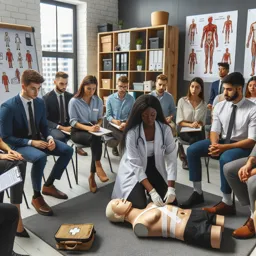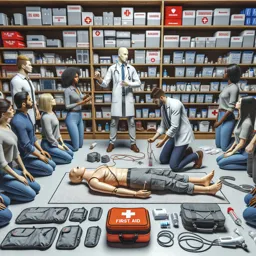Every parent wants to ensure the safety and well-being of their children. One of the most effective ways to prepare for emergencies is to take a first aid course specifically designed for parents. These courses provide essential skills and knowledge to handle common childhood injuries and illnesses, offering peace of mind and the ability to act quickly and confidently when needed.
The Importance of First Aid Training for Parents
Children are naturally curious and energetic, which sometimes leads to accidents and injuries. Whether it’s a minor scrape or a more serious incident, knowing how to respond appropriately can make a significant difference. First aid training equips parents with the skills to provide immediate care and stabilize the situation until professional help arrives.
Key Skills Taught in First Aid Courses for Parents
1. CPR and Choking Relief
One of the most critical skills covered in first aid courses is cardiopulmonary resuscitation (CPR). Parents learn how to perform CPR on infants and children, as well as techniques to relieve choking. These skills are vital in saving lives during cardiac or respiratory emergencies.
2. Wound Care and Bleeding Control
Parents are taught how to clean and dress wounds, control bleeding, and recognize signs of infection. Proper wound care can prevent complications and promote faster healing.
3. Handling Burns and Scalds
Courses cover the treatment of burns and scalds, including how to cool the affected area, protect the skin, and determine when to seek medical attention. Quick and proper action can minimize damage and reduce pain.
4. Recognizing and Responding to Allergic Reactions
Allergic reactions can escalate quickly, making it crucial for parents to recognize the signs and know how to respond. Training includes the use of epinephrine auto-injectors (EpiPens) and other medications.
5. Managing Fever and Febrile Seizures
Parents learn how to manage fever in children, understand when it becomes a concern, and how to handle febrile seizures. This knowledge helps in keeping the child comfortable and ensuring appropriate care.
6. Dealing with Poisoning
Courses provide guidance on what to do if a child ingests a toxic substance, including identifying symptoms of poisoning and contacting poison control centers. Immediate action can prevent severe consequences.
7. First Aid for Fractures and Sprains
Parents are taught how to immobilize fractures and sprains, apply cold packs, and provide comfort until professional medical help is available. Proper handling can prevent further injury and reduce pain.
Choosing the Right First Aid Course
When selecting a first aid course for parents, consider the following factors:
- Certification: Look for courses that offer certification from reputable organizations such as the Red Cross or the American Heart Association.
- Comprehensive Curriculum: Ensure the course covers a wide range of topics relevant to childhood emergencies.
- Hands-On Training: Courses with practical, hands-on training provide the best learning experience.
- Instructor Credentials: Experienced and certified instructors can provide high-quality education and practical insights.
- Flexibility: Online and in-person options can accommodate different schedules and learning preferences.
Benefits of First Aid Training for Parents
1. Increased Confidence
Knowing how to handle emergencies boosts parents’ confidence in their ability to care for their children. This confidence can make a significant difference in stressful situations.
2. Quicker Response Time
Trained parents can respond more quickly and effectively, providing immediate care that can stabilize the child and prevent the situation from worsening.
3. Enhanced Safety Awareness
First aid training increases awareness of potential hazards and encourages preventive measures to create a safer environment for children.
4. Peace of Mind
Having the skills to manage emergencies provides peace of mind, knowing that you are prepared to protect your child’s health and safety.
Conclusion
First aid training for parents is an invaluable investment in your child’s safety and well-being. By learning essential skills and gaining confidence in handling emergencies, you can create a safer environment and be prepared to act swiftly when needed. Enroll in a first aid course today to ensure you have the knowledge and tools to keep your children safe.



























